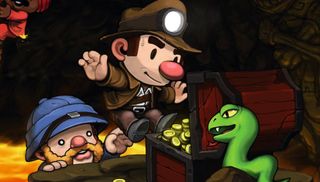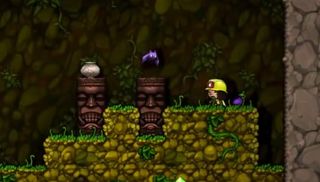Derek Yu on the state of indie and his new book about Spelunky


Derek Yu is the creator of Spelunky. He was also co-creator of 2007 Metroidvania adventure Aquaria, and the 2002 freeware action adventure Eternal Daughter. He's also the writer of the book Spelunky. Maybe one day there will be a film adaptation of Spelunky. We can only hope.
The best thing about Derek Yu’s new book about Spelunky is that it answers all the questions I’ve ever wanted to ask about his game. The worst thing about Derek Yu’s new book about Spelunky is that it leaves very few questions to ask him directly. Part indie development motivational tome, part technical retrospective, Spelunky (the book) is something fans of the game will devour in one sitting, just as I did.
Published by Boss Fight Books, Spelunky traces the game’s origins as a free-to-play browser game built in GameMaker, through to the release of the HD remake on XBLA in 2012 and PC the following year. Back then, major indies arriving on console was still a novelty, Early Access and Kickstarter weren’t yet phenomenons, and the roguelike had yet to have its unlikely revival, save for The Binding of Isaac.
Spelunky is a divisive game: those who love it sing its praises at every given opportunity, while those who dislike it do so with a belligerent, unreasonable and frankly alarming passion. When PC Gamer named it the best game of 2013, you better believe there was much handwringing involved. For those who love the game, reading about how and why the Hell Run chain was installed, or what inspired the eggplant, will be required reading. Accessible dives into the logic behind the game’s randomised dungeons is also present, as is a sort-of manifesto on Yu’s preference for game worlds that are “indifferent” to the player.
I spoke to Derek on Skype a couple of weeks ago. His book is out now through Boss Fight.
PC Gamer: Was it as difficult writing a book as it was making a game?
Derek Yu: Yeah, it was pretty difficult. I mean, going into it I hadn’t written anything over a few pages long – in college I remember writing papers that were about three pages long. The sheer enormity of having to write something that long was pretty daunting. Mainly, I just realised I didn’t have as many writing tools as I thought I had – and I don’t mean keyboard. [I mean] the vocabulary, the phrases that one needs to put a book together of that length. You need to find ways of saying things that sound interesting, but you need the variety as well. The final book I think ended up being 48,000 words or something like that, so writing and having it edited by professional writers, I realised how many stock phrases and words I really rely on day-to-day. You need to come up with more interesting ways to say things. Putting your thoughts out there is one thing, but putting your thoughts into a form that reads well and is interesting is another.
Then there’s the difficulty of describing game design and gameplay using words and making it sound interesting: I’ve always had a hard time with that. In the book I started with how I would introduce Spelunky to people when I met them for the first time. That’s always been a difficult thing for me because there’s so much in the game, and boiling that down into a few sentences, even for people who are familiar with games, is hard. If you think about a lot of classic games, if you try to describe them in words for readers who have no background with them, [it can be hard]. Like Mario: you’re this little guy breaking blocks. It sounds weird and totally not fun at all. That’s probably why, when we describe games, we rely so much on “it’s X meets Y”, this is the Dark Souls of strategy games, or something like that. Because it’s so hard to describe in words what playing a video game is really like and how that’s exciting. All of that was very challenging.
PC Gamer Newsletter
Sign up to get the best content of the week, and great gaming deals, as picked by the editors.
PCG: Do you still play Spelunky?
DY: No, not really. I played it so much during development and immediately after release. I’d be interested in how many developers play their games. I mean, every now and again I’ll play a little bit, usually just to check something. When I was working on the book and wanted to check something, I’d play the game. You have to realise I’ve been playing Spelunky since the original freeware version in 2008, and I played it until the release of the PlayStation versions of the game. I’d been playing it non-stop.
PCG: Sometimes I think I’m done with Spelunky. I leave it for two to three months, but then something happens and I’m sucked back in.
DY: I think the other thing for me is that it still hasn’t been long enough that I can play it for fun. When I’m playing a game I’m still always a bit on edge in terms of thinking about it, wondering what’s going to go wrong, thinking about how I’d make improvements. There’s not really much I would improve with Spelunky, but the feeling that I should be looking for those things is still present. At this point if I wanted to play a video game for fun or to relax, I’m not going to play one of my own games.

PCG: You say there’s not much you’d improve about Spelunky, but that implies there are small things. Is that true?
DY: Yeah, I don’t really think there are, to be honest. I think Spelunky as it is, is pretty set. Another thing is, as time passes even things that may have been flaws become part of the game. I could say, ‘maybe I want to improve the graphics because I’m better at drawing now’, but you start to get used to something the way it is and has been, and you don’t want to change it because the flaws become part of its character and personality. Aside from maybe some small bugs lingering in the game, I don’t think there’s anything – especially anything fundamental to the design.
PCG: Since Spelunky HD released on XBLA in 2012, Early Access has become popular. It somewhat mirrors the way you initially developed Spelunky in GameMaker, seeking feedback from the TIGsource community. Do you think the rise of Early Access is a good thing, or not?
DY: I think it’s good. I personally wouldn’t ever do Early Access. At this point I feel like I wouldn’t use it unless I really had to for some reason, because I wouldn’t want that pressure of having people watch the development as it progresses. It would be more difficult to make the decisions I need to make. It’s the same reason I probably wouldn’t do a Kickstarter: I think a lot of people do it not just for the funding but for the marketing and promotion, but I think right now, with the sales of Spelunky and Aquaria, I can fund my next game myself and choose not to go the Kickstarter route, even for the promotion. Investors make it harder, and adds more pressure – it gets people’s expectations going before you really want them to have any expectations.
Expectations are so critical. I think that people’s expectations of the remake of Spelunky, based on the original, coloured the way that they saw the game when it first came out. I think there was a significant amount of criticism of the remixed music and graphics, because people were so used to the pixel art and the original music. If that original game didn’t exist, those people who didn’t like the new graphics and music probably wouldn’t have felt the same way, without those expectations. Early Access can be great, but you need to weigh the trade-offs very carefully. For people who need the funding, or for people who need the motivation… I think it can be hard to make a game that no one will see for years. I even released the freeware version of Spelunky as a beta on TIGsource in part because I wanted the motivation. I didn’t know if it was good. But you may not need any of those things.

PCG: Late last year there was a lot of chatter about a so-called "Indiepocalypse", and the gist was that it’s much harder to get any exposure as an independent developer nowadays, because the market is so saturated. Do you think that’s true?
DY: It’s hard to say for me, because I’ve released Aquaria and Spelunky, and having already released some successful games really makes a huge difference. I mean, I think Jon Blow said it himself about The Witness, that because of Braid a lot of people checked it out. It is hard for me to speak on what it would be like, or what it’s like for new developers right now.
Things like Indiepocalypse and “this is the end of indie”: those kind of phrases I don’t really buy into. I think there are definitely a lot of new challenges now that indie gaming – and gaming in general – is a much larger and more diverse place. That said, I think there are a lot of benefits to that, the tools are better, and I think there are a lot more resources available for people to use to make their games, to distribute their games and to learn how to make games. I definitely don’t think indie gaming as a whole is in trouble. I think there are some new challenges but there are some new positives. I think the competition level is definitely higher, but the tools and resources are better.
PCG: Do you think there are too many games now?
DY: It’s hard for me to say “I wish that there were fewer games”. I just want to see more and more games. The more the better. It’s definitely more crowded though, and I will say that it was probably easier to get noticed when I was working on Aquaria and Spelunky. That said, it also seemed scarier then because not as many people were doing it. It felt more lonely, it felt more like… what are we doing? Is this even a legitimate thing to be doing as a career? How are we going to sell our game, and will people even want to buy it, compared to the big blockbusters? There were a lot more questions. That said, it also felt very cosy, and when you did meet other indies at GDC or wherever, it really felt like a family. Now I think there are so many more people, it definitely feels more crowded now.
Next page: Derek's favourite Spelunky character, and why deathmatch mode never caught on.
Shaun Prescott is the Australian editor of PC Gamer. With over ten years experience covering the games industry, his work has appeared on GamesRadar+, TechRadar, The Guardian, PLAY Magazine, the Sydney Morning Herald, and more. Specific interests include indie games, obscure Metroidvanias, speedrunning, experimental games and FPSs. He thinks Lulu by Metallica and Lou Reed is an all-time classic that will receive its due critical reappraisal one day.

